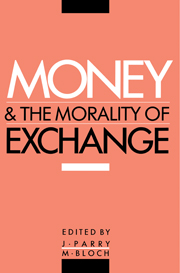Book contents
- Frontmatter
- Contents
- List of contributors
- 1 Introduction: Money and the morality of exchange
- 2 Misconceiving the grain heap: a critique of the concept of the Indian jajmani system
- 3 On the moral perils of exchange
- 4 Money, men and women
- 5 Cooking money: gender and the symbolic transformation of means of exchange in a Malay fishing community
- 6 Drinking cash: the purification of money through ceremonial exchange in Fiji
- 7 The symbolism of money in Imerina
- 8 Resistance to the present by the past: mediums and money in Zimbabwe
- 9 Precious metals in the Andean moral economy
- 10 The earth and the state: the sources and meanings of money in Northern Potosí, Bolivia
- Index
6 - Drinking cash: the purification of money through ceremonial exchange in Fiji
Published online by Cambridge University Press: 20 February 2010
- Frontmatter
- Contents
- List of contributors
- 1 Introduction: Money and the morality of exchange
- 2 Misconceiving the grain heap: a critique of the concept of the Indian jajmani system
- 3 On the moral perils of exchange
- 4 Money, men and women
- 5 Cooking money: gender and the symbolic transformation of means of exchange in a Malay fishing community
- 6 Drinking cash: the purification of money through ceremonial exchange in Fiji
- 7 The symbolism of money in Imerina
- 8 Resistance to the present by the past: mediums and money in Zimbabwe
- 9 Precious metals in the Andean moral economy
- 10 The earth and the state: the sources and meanings of money in Northern Potosí, Bolivia
- Index
Summary
Many times during the eighteen months of my fieldwork in the village of Sawaieke on the island of Gau, Central Fiji, I listened to one or other of my hosts champion na i vakarau ni bula vakaviti, ‘the Fijian way of life’ which he or she contrasted with na i vakarau ni bula vakailavo se vakavavalagi, ‘a way of life in the manner of money or in the European way’. Virtually all Fijian villagers remark on this contrast to visiting Europeans and they do so in an entirely predictable way. The speech below is that of the elderly man who, in the early months of my fieldwork, gave me lessons in Fijian:
The Fijian way of life is good eh? Nothing is paid for. If you want to eat there are many kinds of food available – taro, cassava, chestnuts, yams, green vegetables, pawpaw, pineapples. The food's not paid for, it is just given. You are hungry? Yes. Fine. Come and eat, come and eat here. Come here and eat fish. You want to drink? Fine, come and drink yaqona here. Should a guest come here we look after him. If he wants something it is given to him at once. It is not paid for. No, not at all. This is the Fijian way, the chiefly way, the way according to kinship. Kinship and life in the manner of kinship are good things – there are never any problems. […]
- Type
- Chapter
- Information
- Money and the Morality of Exchange , pp. 142 - 164Publisher: Cambridge University PressPrint publication year: 1989
- 29
- Cited by



